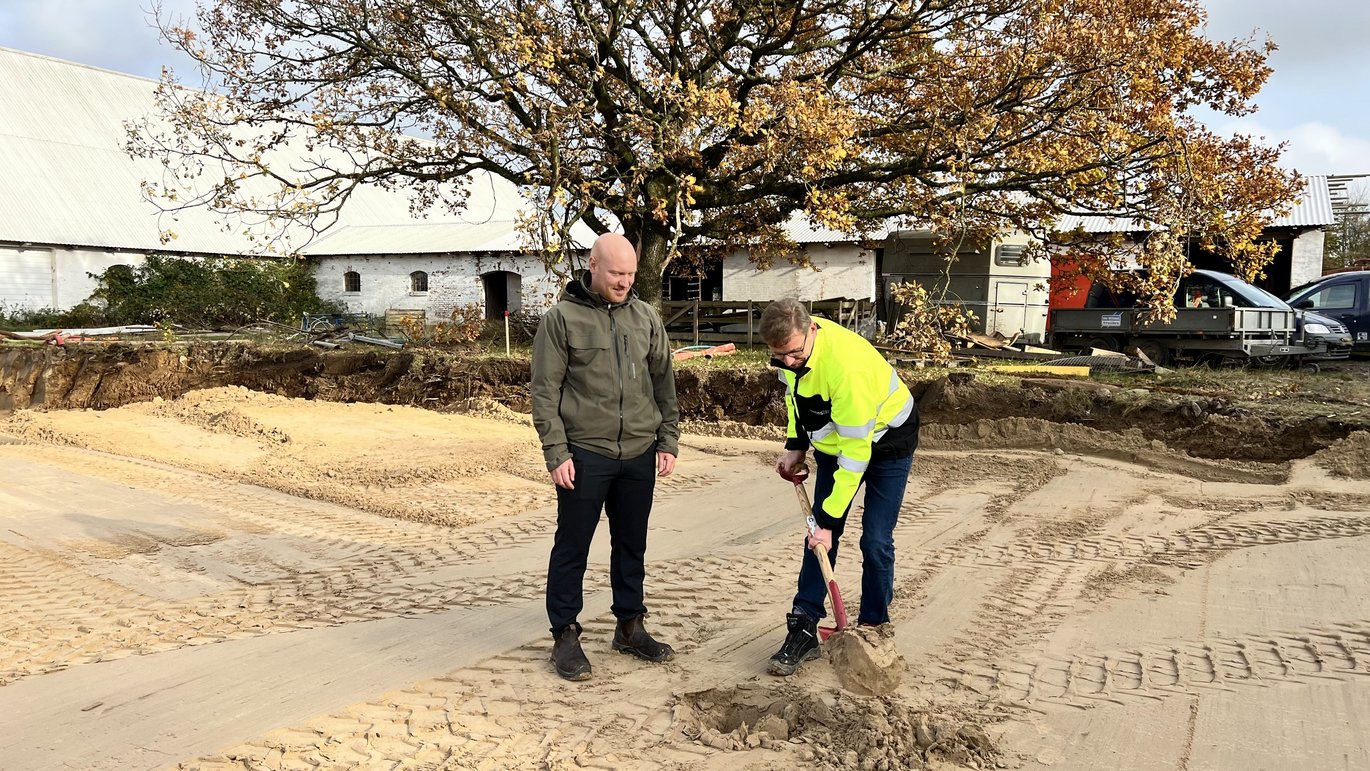Groundbreaking ceremony for unique climate plant in North Jutland, Denmark
Aarhus University is a part of an innovational project aimed at developing pyrolysis into an efficient and economical climate technology for Danish agriculture. The SkyClean Scale-up project has received DKK 124 million from NextGenerationEU, and the first ground has just been broken for the new pyrolysis plant

Pyrolysis of biomass is a source of sustainable and climate-friendly energy, and it also produces a solid carbon product called biochar, which can act as carbon storage in agricultural soil and contribute to increase soil water-holding capacity and pH.
The SkyClean Scale-up project focuses on the pyrolysis technology, as well as opportunities to expand facilities and increase awareness of the use of biochar in Danish agriculture. From Aarhus University, the Department of Agroecology, the Department of Environmental Science and the Department of Ecoscience are participating in studies on the effects of biochar on greenhouse gas emissions and soil biology.
Denmark's largest plant
SkyClean Scale-up has received a grant of DKK 124 million from NextGenerationEU (the pyrolysis pool). The Danish Energy Agency is distributing the funds from the pool, which is a special initiative adopted in the Finance Act 2021. The aim is to promote technologies with high potential for reducing greenhouse gas emissions from agriculture.
A large part of the SkyClean Scale-up project funds will go towards the construction of Denmark's largest SkyClean pyrolysis plant. The groundbreaking ceremony for the large plant has just taken place at the home of North Jutland farmer Daniel Overgaard Pedersen. The plant will use agricultural residues both for the production of biochar and for the production of advanced biofuels. Stiesdal SkyClean A/S is behind the construction of the plant, which has a capacity of 20 MW. Construction is expected to be completed by 1 May 2023.
The plant will be able to process 40,000 tonnes of dried residual fibre from the biogas plant annually. It will be able to produce 14,000 tonnes of biochar and a large amount of green gas. According to the project team, the production of biochar alone is equivalent to reducing emission of around 26,000 tonnes of CO2 to the atmosphere each year.
Biochar and biofuel
SkyClean Scale-up consists of a broad group of partners from Aarhus University, Stiesdal SkyClean, BB Bioenergi, KK Wind Solutions, Aktive Energianlæg, Topsoe, Vestjyllands Andel, SEGES, DTU Kemiteknik, DTU Construct, Roskilde University Center, University of Copenhagen/Plan and Environment, Food & Bio Cluster and Energy Cluster Denmark.
The aim is to provide the basis for the expansion of pyrolysis and the use of biochar in Denmark. According to the project partners, 100 plants could achieve an annual reduction in greenhouse gas emissions from the Danish agricultural sector of at least 2 million tonnes of CO2 by 2030. In addition, the green fuels from pyrolysis production can replace fossil fuels, corresponding to an annual reduction in Danish greenhouse gas emissions in 2030 of at least 1.6 million tonnes of CO2.
Additional information | |
| Collaborators | Department of Agroecology at Aarhus University, Department of Environmental Science at Aarhus University, Department of Ecoscience at Aarhus University, Stiesdal SkyClean, BB Bioenergi, KK Wind Solutions, Aktive Energianlæg, Topsoe, Vestjyllands Andel, SEGES, DTU Kemiteknik, DTU Construct, Roskilde University Center, University of Copenhagen/Plant and Environment, Food & Bio Cluster and Energy Cluster Denmark |
| Funding | NextGenerationEU through the Danish Energy Agency |
| Amount allocated | DKK 124 million |
| Project period | 2022-2025 |
| Contact | Project Manager Christian Munk, Energy Cluster Denmark. Tel: +45 50552606 or mail: cmj@energycluster.dk Associate Professor Lars Elsgaard, Department of Agroecology, Aarhus University. Mail: lars.elsgaard@agro.au.dk |
